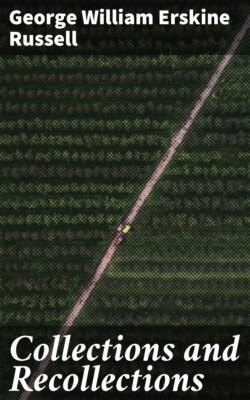Читать книгу Collections and Recollections - George William Erskine Russell - Страница 15
На сайте Литреса книга снята с продажи.
Оглавление'And Lord Mount Coffee-house, the Irish peer,
Who killed himself for love, with drink, last year.'"
When a very impecunious youth, who could barely afford to pay for his cab fares, lost a pound to him at whist, Lord Houghton said, as he pocketed the coin, "Ah, my dear boy, the great Lord Hertford, whom foolish people called the wicked Lord Hertford—Thackeray's Steyne and Dizzy's Monmouth—used to say, 'There is no pleasure in winning money from a man who does not feel it.' How true that was!--" And when he saw a young friend at a club supping on pâté de foie gras and champagne, he said encouragingly, "That's quite right. All the pleasant things in life are unwholesome, or expensive, or wrong." And amid these rather grim morsels of experimental philosophy he would interject certain obiter dicta which came straight from the unspoiled goodness of a really kind heart. "All men are improved by prosperity," he used to say. Envy, hatred, and malice had no place in his nature. It was a positive enjoyment to him to see other people happy, and a friend's success was as gratifying as his own. His life, though in most respects singularly happy, had not been without its disappointments. At one time he had nursed political ambitions, and his peculiar knowledge of foreign affairs had seemed to indicate a special line of activity and success. But things went differently. He always professed to regard his peerage as "a Second Class in the School of Life," and himself as a political failure. Yet no tinge of sourness, or jealousy, or cynical disbelief in his more successful contemporaries ever marred the geniality of his political conversation.
As years advanced he became not (as the manner of most men is) less Liberal, but more so; keener in sympathy with all popular causes; livelier in his indignation against monopoly and injustice. Thirty years ago, in the struggle for the Reform Bill of 1866, his character and position were happily hit off by Sir George Trevelyan in a description of a walk down Piccadilly:—
"There on warm midsummer Sundays Fryston's Bard is wont to wend,
Whom the Ridings trust and honour, Freedom's staunch and jovial friend:
Loved where shrewd hard-handed craftsmen cluster round the northern kilns—
He whom men style Baron Houghton, but the Gods call Dicky Milnes."
And eighteen years later there was a whimsical pathos in the phrase in which he announced his fatal illness to a friend: "Yes, I am going to join the Majority—and you know I have always preferred Minorities."
It would be foreign to my purpose to criticize Lord Houghton as a poet. My object in these chapters is merely to record the characteristic traits of eminent men who have honoured me with their friendship, and among those there is none for whose memory I cherish a warmer sentiment of affectionate gratitude than for him whose likeness I have now tried to sketch. His was the most precious of combinations—a genius and a heart. An estimate of his literary gifts and performances lies altogether outside my scope, but the political circumstances of the present hour[4] impel me to conclude this paper with a quotation which, even if it stood alone, would, I think, justify Lord Beaconsfield's judgment quoted above—that "he was a poet, and a true poet." Here is the lyrical cry which, writing in 1843, he puts into the mouth of Greece:—
"And if to his old Asian seat,
From this usurped, unnatural throne,
The Turk is driven, 'tis surely meet
That we again should hold our own;
Be but Byzantium's native sign
Of Cross on Crescent[5] once unfurled,
And Greece shall guard by right divine
The portals of the Easter world."
NOTES:
[4]
March 1897.
[5]
The Turks adopted the sign of the Crescent from Byzantium after the Conquest: the Cross above the Crescent is found on many ruins of the Grecian city—among others, on the Genoese castle on the Bosphorus.
